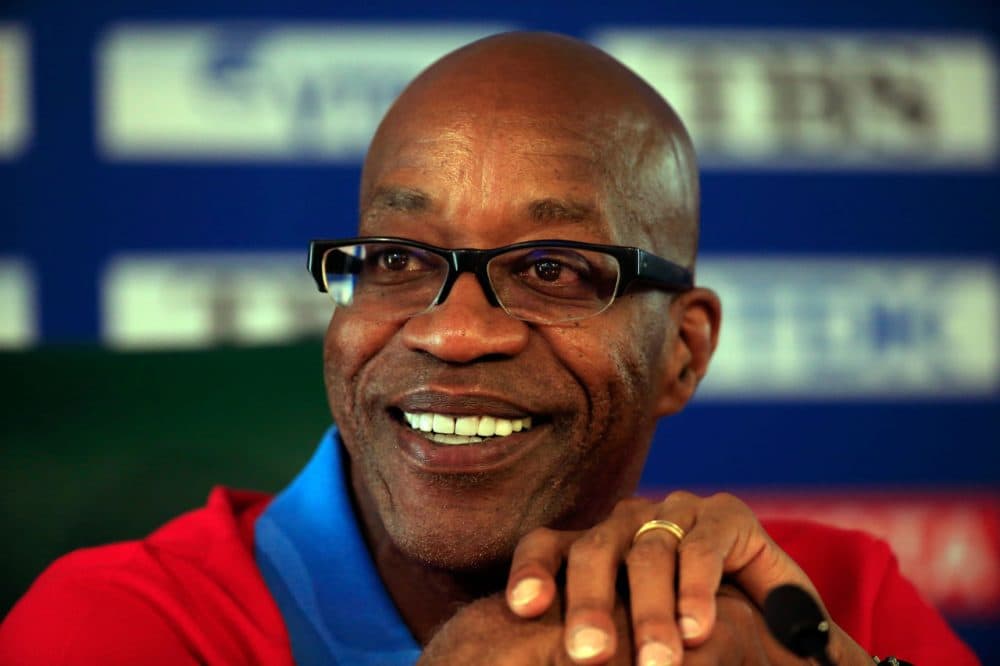Advertisement
Former Olympian Edwin Moses: American Sports Don't Need Saving

In a new book endorsed by Ralph Nader, author Ken Reed proposes a plan to "save" sports in the U.S. "When you look at the United States, we're really a spectator-mad country, not a sports-mad country," Reed explained to Bill Littlefield on Only A Game.
In order to get more people playing — rather than watching — sports, Reed is advocating for the appointment of a sports minister.
Former Olympic champion Edwin Moses, now the chairman for the Laureus Sports for Good Foundation, doesn't agree. Moses made his case to Bill Littlefield.
"There's no other country in the world that's doing as well as we are in sports."
Edwin Moses
So I think we do a very good job, from the United States Olympic Committee, which is a fantastic non-profit organization and has an independent board of directors, from the United States Anti-Doping Agency, of which I'm the chairman of the board, to all the great professional sports leagues in the United States, which happen to be the best in the world anywhere. I think we do a great job of managing ourselves and being independent and being economically viable as well.
BL: Part of the argument for some sort of ministry of sport is that too many Americans aren't engaged actively in athletics or sports. Does the current sports agenda serve them, do you think?
EM: Well, I think that's a different issue. I think if you talk about activity and sports, I think perhaps the Department of Education could be able to suggest more to get kids more involved in sports. But I'm not so sure if it's a government mandate to get people involved in sports. We have some countries in the world that do tend to do that but doesn't make them more successful in sports by any means.
[sidebar title="A Plan To Save Sports" width="630" align="right"]Consumer advocate and former presidential candidate Ralph Nader backs a plan to "save" sports.[/sidebar]I think that people, if they want to get involved in sports, they can do it independently. In Europe, in Germany for example, they have a fantastic club system, and it's very inexpensive. And if you want to participate in sports in Germany you pay maybe $15-$20 a month and you have everything at your fingertips.
BL: As chairman of the Laureus Sport for Good Foundation, you see sports improving lives all across the globe. But are sports having as big a positive impact on the health of people as they could have here in the U.S.?
EM: I believe so. I mean if you look at running for example there's a couple of million people who are members of United States Track and Field Association. You know there's millions of people who run 10ks, marathons. We have people doing all kinds of sports. I just think it's a personal choice to do sports. I think we're doing quite well without a director from the top.
BL: This week you attended the Project Play Summit where your organization met with groups such as the President's Council on Fitness, Sport & Nutrition, the Robert Wood Johnson Foundation and Nike as well. What kind of change comes out of conferences like that one?
EM: Well, you find out that in this country, as doesn't happen in most other countries, there's a tremendous amount of private sector players who do a lot of very interesting things. The Robert Wood Johnson Foundation has a lot of initiatives to promote health and fitness in this country. Our organization has worked with Nike down in New Orleans to set up a Model Cities program to help kids in after school programs, give them something to do, somewhere to go, a place that's safe and physical activity after school.
So there's a whole cadre of people here in the United Sates: private individuals, corporations, many, many different private foundations and community service organizations that do a lot — do a lot independently and do a very good job directing their own policies and business and getting things done very, very quickly without the politics.
BL: The title of Ken Reed and Ralph Nader's book is "How We Can Save Sports." I don't want to put words in your mouth, but it sounds to me as if you don't think sports need saving.
EM: We're in the largest, most lucrative sporting market in the world, with the most people playing sports with the exception of, perhaps, China and India, strictly because they have much, much greater populations. But, you know, we're in the sports capital of the world, and sports is very lucrative.
We have a fantastic Olympic Committee that does well on its own. We have one of the few countries in the world that has a high school league in boys and girls league. We have the NCAA that has competitions in men's and women's sports. We have other professional sports from skate boarding to skiing to tennis. And there's no other country in the world that's doing as well as we are in sports, so it just doesn't make that much sense to me.
This segment aired on February 28, 2015.